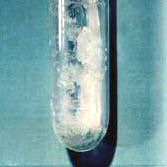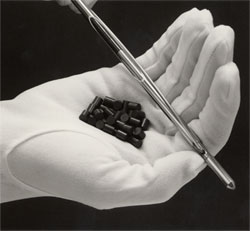Nuclear fuel cycle
Nuclear fuel cycle refers to the series of processes involved in the production and use of nuclear fuel for generating power. This cycle encompasses the mining and milling of uranium, its conversion into a fuel form, its use in a nuclear reactor, and the subsequent handling of the spent fuel, including its storage, reprocessing, and waste disposal. The nuclear fuel cycle is a critical component of the nuclear power industry, ensuring the efficient and safe use of nuclear material for energy production.
Overview
The nuclear fuel cycle starts with the extraction of uranium from the ground. Uranium is a common element found in the Earth's crust, but it requires processing to be used as fuel. Once extracted, uranium ore is milled to produce uranium oxide concentrate, which is then refined and converted into uranium hexafluoride (UF6). This compound can be enriched to increase the concentration of U-235, the isotope necessary for sustaining a nuclear chain reaction.
Following enrichment, the UF6 is converted into uranium dioxide (UO2), which is then fabricated into fuel pellets. These pellets are loaded into metal tubes to form fuel rods, which are assembled into fuel assemblies for use in a nuclear reactor. Within the reactor, the U-235 atoms undergo fission, releasing a significant amount of heat. This heat is used to generate steam, which drives turbines to produce electricity.
After several years in the reactor, the fuel becomes "spent," meaning it no longer contains enough U-235 to sustain an efficient chain reaction. Spent nuclear fuel is highly radioactive and generates heat, necessitating careful handling and management. It can be stored in cooling pools at reactor sites or in dry cask storage facilities while awaiting final disposal or reprocessing.
Reprocessing and Recycling
Some countries opt to reprocess spent nuclear fuel to recover plutonium and unused uranium, which can be recycled into new fuel. This process reduces the volume of high-level waste and makes better use of the original uranium resource. Reprocessed material can be fabricated into mixed oxide (MOX) fuel, which is used in some types of reactors. However, reprocessing is expensive and raises proliferation concerns due to the potential misuse of plutonium.
Waste Disposal
The final stage of the nuclear fuel cycle involves the disposal of nuclear waste. This includes low-level waste (such as contaminated tools and clothing), intermediate-level waste (such as reactor components), and high-level waste (primarily spent fuel). High-level waste requires isolation from the biosphere for thousands of years due to its long-lived radioactivity. Geological disposal in deep underground repositories is the most widely accepted method for disposing of high-level waste, although no such facility is currently in operation for high-level waste from the commercial nuclear fuel cycle.
Challenges and Future Directions
The nuclear fuel cycle faces several challenges, including concerns about nuclear proliferation, the high cost of nuclear power, and public opposition to nuclear waste disposal. Advances in reactor technology and fuel cycle management could address some of these issues. For example, Generation IV reactors promise higher efficiency and reduced waste production. Additionally, new fuel cycle technologies, such as thorium-based fuel or partitioning and transmutation, could further reduce waste and mitigate proliferation risks.
Transform your life with W8MD's budget GLP-1 injections from $125.
W8MD offers a medical weight loss program to lose weight in Philadelphia. Our physician-supervised medical weight loss provides:
- Most insurances accepted or discounted self-pay rates. We will obtain insurance prior authorizations if needed.
- Generic GLP1 weight loss injections from $125 for the starting dose.
- Also offer prescription weight loss medications including Phentermine, Qsymia, Diethylpropion, Contrave etc.
NYC weight loss doctor appointments
Start your NYC weight loss journey today at our NYC medical weight loss and Philadelphia medical weight loss clinics.
- Call 718-946-5500 to lose weight in NYC or for medical weight loss in Philadelphia 215-676-2334.
- Tags:NYC medical weight loss, Philadelphia lose weight Zepbound NYC, Budget GLP1 weight loss injections, Wegovy Philadelphia, Wegovy NYC, Philadelphia medical weight loss, Brookly weight loss and Wegovy NYC
|
WikiMD's Wellness Encyclopedia |
| Let Food Be Thy Medicine Medicine Thy Food - Hippocrates |
Medical Disclaimer: WikiMD is not a substitute for professional medical advice. The information on WikiMD is provided as an information resource only, may be incorrect, outdated or misleading, and is not to be used or relied on for any diagnostic or treatment purposes. Please consult your health care provider before making any healthcare decisions or for guidance about a specific medical condition. WikiMD expressly disclaims responsibility, and shall have no liability, for any damages, loss, injury, or liability whatsoever suffered as a result of your reliance on the information contained in this site. By visiting this site you agree to the foregoing terms and conditions, which may from time to time be changed or supplemented by WikiMD. If you do not agree to the foregoing terms and conditions, you should not enter or use this site. See full disclaimer.
Credits:Most images are courtesy of Wikimedia commons, and templates, categories Wikipedia, licensed under CC BY SA or similar.
Translate this page: - East Asian
中文,
日本,
한국어,
South Asian
हिन्दी,
தமிழ்,
తెలుగు,
Urdu,
ಕನ್ನಡ,
Southeast Asian
Indonesian,
Vietnamese,
Thai,
မြန်မာဘာသာ,
বাংলা
European
español,
Deutsch,
français,
Greek,
português do Brasil,
polski,
română,
русский,
Nederlands,
norsk,
svenska,
suomi,
Italian
Middle Eastern & African
عربى,
Turkish,
Persian,
Hebrew,
Afrikaans,
isiZulu,
Kiswahili,
Other
Bulgarian,
Hungarian,
Czech,
Swedish,
മലയാളം,
मराठी,
ਪੰਜਾਬੀ,
ગુજરાતી,
Portuguese,
Ukrainian
Contributors: Prab R. Tumpati, MD






